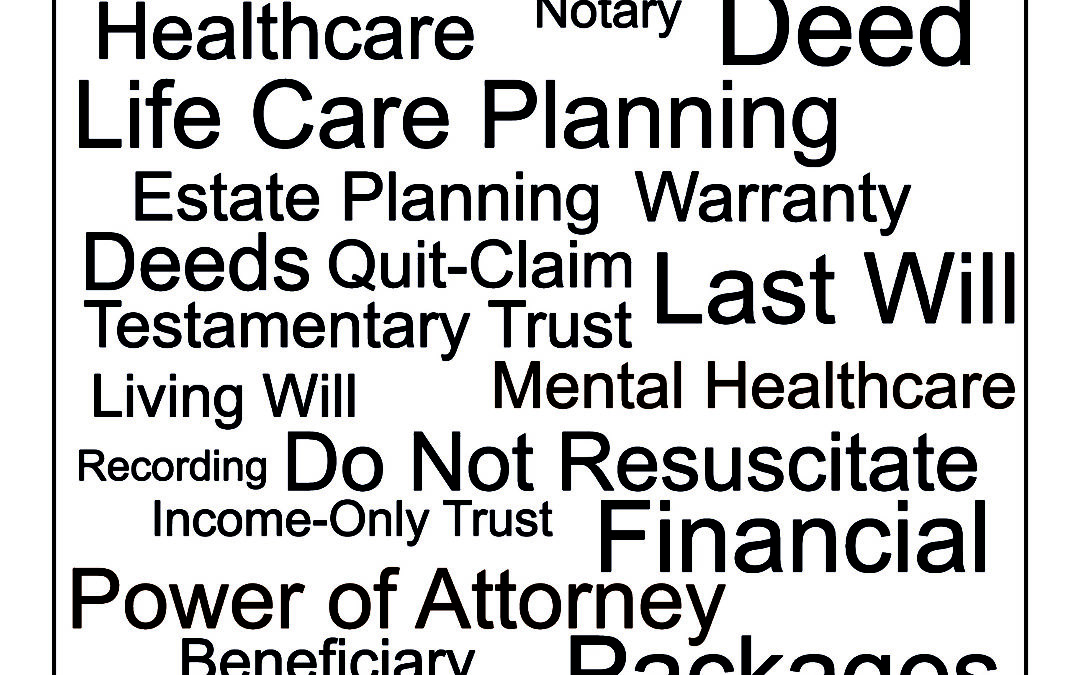A very important part of your long term care planning is having your paperwork in order. Did you know by not putting your wishes in writing the court system may have to become involved in every aspect of your financial decisions and medical care? Wouldn’t you rather be the person who makes those decisions? You can! There are documents that you can sign which name someone you trust to be YOU when you are no longer capable of acting on your own behalf.
We hear this all the time, “I’m not elderly yet, I don’t need these documents.” Or “I can take care of that later.” Putting your wishes in writing is applicable to all adults age 18 or older. No one is guaranteed a tomorrow. No one is guaranteed a perfect life free from illness, accident, or terminal disease.
The time for telling someone your wishes and putting those wishes in writing is NOW!
One client example includes a 23-year old recent college graduate who was in a severe car accident. We met with her parents shortly thereafter. She was in a coma and unable to express her wishes. Because she had not put her wishes in writing, her parents spent over $10,000.00 to have the court appoint them as her conservator and guardian to manage her finances and to make decisions regarding her health care. This could have been avoided had she taken the time to put her documents in place. She was young and probably believed that nothing like that would ever happen to her.
Carol Aragon-Montgomery is a Certified Legal Document Preparer at ALTCS Planning.net and can prepare the legal documents listed in this article. Call 480-464-4968 to schedule your consultation today.
Don’t wait until it’s too late. You can make the decisions for yourself.
Here is some information about the types of documents you should consider completing as soon as possible. The documents may include: Financial Power of Attorney, Medical Power of Attorney, Mental Health Care Power of Attorney, Living Will, Pre-Hospital Medical Care Directive, Living Trusts, Last Will & Testaments, and Beneficiary Deeds.
FINANCIAL POWER OF ATTORNEY
This is a document that allows you to appoint someone to handle your financial affairs on your behalf.
- You will want to choose someone you trust to make your financial decisions.
- A durable financial POA means that the document continues to be legally valid even if you become incapable or unable to handle your finances.
- You can make this document effective immediately or only upon your incapacitation.
- You may want to name one or two alternate agents in case first person is unavailable or unable to act as your agent.
- It must be witnessed by someone not related to you and notarized to be valid.
MEDICAL OR HEALTH CARE POWER OF ATTORNEY
This is a document that allows you to appoint someone to handle your medical care and health care decisions on your behalf IF you become incompetent or incapacitated.
- You will want to choose someone you trust to honor your personal wishes with regard to your health care and health care treatments.
- It is only valid when you are incompetent or incapacitated and unable to express your own health care wishes.
- You may want to name one or two alternate agents in case the first person designated is unavailable or unable to act as your agent.
- This document must be either witnessed by one person not related to you OR notarized to be valid.
MENTAL HEALTH CARE POWER OF ATTORNEY
This is a document that allows you to appoint someone to handle your mental health care decisions on your behalf and allows that person to admit you into a psychiatric treatment facility IF you become incompetent or incapacitated.
- You will want to choose someone you trust to honor your personal wishes with regard to your mental health care and mental health care treatments.
- It is only valid when you are incompetent or incapacitated and unable to express your own mental health care wishes.
- You may want to name one or two back-up agents in case the first person designated is unavailable or unable to act as your agent.
- Must be either witnessed by two people not related to you OR notarized to be valid.
LIVING WILL
This is a document that allows you to express, in writing, which medical treatments you want or don’t want at the end of your life.
- A living will informs your family and loved ones what YOU want and how you wish to be treated at the end of your life.
- It must be either witnessed by one person not related to you OR notarized to be valid.
Pre-hospital Medical Care Directive (DO NOT RESUSCITATE)
This is a document that informs emergency medical personnel and hospital emergency personnel regarding your wish to NOT be resuscitated.
- With this document you are asking emergency personnel to NOT use equipment, drugs, or devices to restart your heart or breathing.
- It must be on letter-sized orange colored paper or wallet-sized orange colored paper to be valid.
- You must attach a picture or complete personal information with your physical description.
- It must be signed by you in front of a witness.
- It must be signed by your witness and health care provider acknowledging that you understand the consequences of using this form.
LIVING TRUST
A living trust is a written agreement that sets forth who will manage the assets placed in it during your lifetime, in the event of your incapacity, and upon your death.
- A living trust avoids the cost and delays of probate. Upon your death (and your spouse, if married), your Successor Trustee can distribute the assets almost immediately and with little or no additional expense (other than typical costs such as real estate commissions, etc.) Court supervision is not required.
- A living trust avoids conservatorship if you become incapacitated.
- A living trust keeps your estate affairs private. A Will that goes through probate makes all aspects of your estate a matter of public record.
- This document must be signed by all Trustors and Trustees and notarized to be valid.
LAST WILL & TESTAMENT
A last will & testament is a written document that sets forth who (a personal representative / executor) will manage your estate upon your death. It also allows you to express in writing how you want your estate divided (who are your heirs and the amount of your estate he / she / they will inherit).
- A last will & testament must be probated and becomes public record.
- A last will & testament can name guardians for your minor children.
BENEFICIARY DEED
- A beneficiary deed allows a person in Arizona who owns real property to name a beneficiary ahead of time to allow real property to pass to an heir without probate.
- To be valid, a beneficiary deed must be notarized and recorded before the death(s) of the real property owner(s).
Check out http://s528550011.onlinehome.us/services/cost/ for a list of our current legal document fees.


